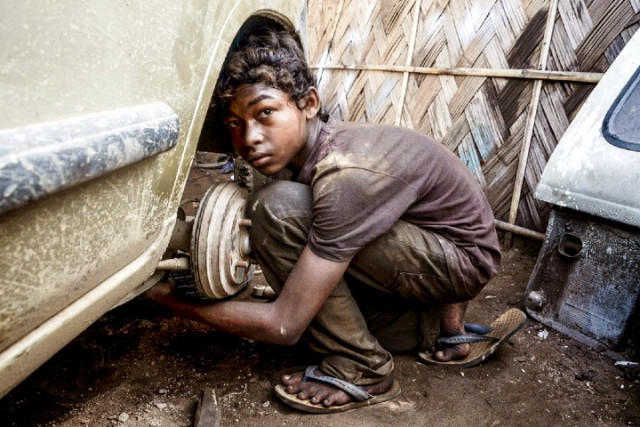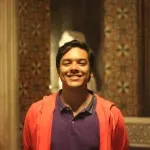“Chotay! Sab kaam chhor, sahab ke liye chai la!”
(Junior! Leave everything else, bring tea for sir)
“Chotay! Ustad ki bike pe kapra maar jaldi!”
(Junior! Quickly clean your master’s bike)
“Chotay! Abay chotay! Kisi kaam ka nahi hai tu, nikammay!”
(Junior! You are good for nothing, you nincompoop!)
My life revolves around these few phrases.
Phrase that pierce through my 11-year-old heart.
Did I choose this life?
Did I wish to be in this position, where I am often looked at with sympathetic eyes and silent tongues?
No.
But I am thankful to God for giving me this life.
This auto-mechanic garage is my home away from home. My safe abode. The workers, my brothers, Ustad my father, everyone calls me chota (junior). Little do they know, I’m actually the bara (senior) of my own home.
Two years ago on a Sunday morning, like every other day, I woke up in my small house, ready to go out and play cricket with my friends. My Baba lay in his bed, still passed out from his night out gambling and drinking. Amma was outside washing our clothes. My little sister, Gurya, was sitting down, playing with her dolls. My brother, Billu, was still asleep.
Call it fate or luck, my little brother was ill, and he was saved from the tragic events that were to follow me that day. I remember clearly, I was wearing my favourite red jacket and white joggers that Amma had gotten me on Eid. She said her Begum Sahiba had asked her son to give those to me. They were a bit muddy, but I washed them with surf and they looked as good as new after that.
Around an hour into our cricket game, I got run-out and sat with my neighbour and best friend, Jamal, in the corner of our street. A little while later, we were approached by a man in an old, open roof Suzuki, who crammed his car into our narrow street and asked us if we wanted to go to a bigger ground a little far away from there. We asked the rest of the clan and excitedly got into the back of his car.
All 10 of us.
Jumping with joy and dreaming of bigger shots and longer sixes.
A while after driving around, the man stopped his car in a big alley. Next to a garage. Kind of a warehouse. He got off and asked us to follow him. Confused but excited still, we followed him. Jamal and I were leading the line, while the rest of the boys followed us. He stopped in front of a big gate and asked us to go in one by one. As soon as the gate opened, we were pushed in, almost forcefully, by the man. A big, scary man welcomed us in. His red teeth and bushy mustache are sights I would never forget. He dragged us in, and locked us all in a small room. The 10 of us screaming kids were now locked inside a jail-like room, still holding our bats and balls, crying.
We just wanted to play cricket in a bigger ground!
The two men greeted each other. Hugged, laughed like they were two players, celebrating their victory. They were Altaf and Asif.
“Khayal rakhna inn bachon ka!” Altaf said.
(Take care of these kids)
I can never forget their names.
Soon they vanished into the darkness and left us all crying in that dark, cold room. The dimly-lit bulb in one corner did little to hide our tears. We spent the entire day and night crying. Praying. What else can nine and 10-year-olds do?
Now, did I choose to be in that room? To hear my brothers cry in unison? No.
The next morning, Asif was back. He opened the gates. Smiling, he pointed a gun at us. He ordered us to stand in line. Jamal and I were at the back this time. He asked us to follow him. When only Jamal and I were left in the room, he pushed us back and told us to stay in. He took eight of my brothers along with himself.
We could hear him say,
“Koi hoshiyari ki tou bhaija urra doon ga!”
(If you act smart I will blow your brains out.)
“Inn doh ko shaam mai lay jaon ga!”
(I will take these two in the evening.)
Jamal and I hugged each other. He cried. I didn’t. We missed our Amma and Baba. We did not want to play cricket anymore. We promised we’d never play cricket again. We just wanted to go home.
A little while after my friends were taken away, Asif was back, this time with no gun. He stood there, and ordered us to quietly follow him. Jamal wanted to take his bat with him. Asif slapped him hard, but despite the tears, Jamal kept the bat in his hand. Asif ignored it.
“Muu bannd rakhna!”, he said.
(Keep your mouth shut)
We did as we were told. What else can nine and 10-year-olds do?
He held our arms, and took us into the room of our nightmares! Screams of children of all ages filled the room. There were men sitting around with knives and blades in their hands. They were busy pricking out eyes, cutting noses, breaking arms. This was an Adda (crime hub), as it is known, where kidnapped children are made into fakeers (beggars) and kachray wale (trash pickers).
Some younger ones are left alone, to sell tissue papers and clean car windscreens, while the others are made into human dummies. We couldn’t see our friends. I remained quiet. Jamal, however, started crying. He swung his bat in fear. It hit Asif right where it hurts the most. Asif fell down in pain, saying words we couldn’t understand.
Jamal made a run back to where we came from, and I followed him frantically. We ran amidst Asif’s screams. We made a dash. I never thought I could run this fast. If only I ran this fast yesterday, I wouldn’t have been run-out! We saw the gate we had entered from yesterday that opened in the big alley. I may have been small, but I was the bara of the family - I had to go back home. We ran. Asif followed us. But we ran faster and managed to escape into the alley. We saw daylight but didn’t stop running. We did not know where we were going, but we still ran.
We ran for maybe 10 minutes when we saw our neighbourhood. We ran straight to our homes. Amma was crying. So was Gurya. Billu was still in bed. Baba saw me at the gate. He ran towards me and slapped me hard. He must have been drunk. I couldn’t tell. But I was crying because I was home. I promised to never go out and play cricket again. I told Amma and Baba about where I was, about Altaf and Asif. Amma kept kissing me and Baba didn’t care. He ordered me to take money from Amma and get him a pack of tobacco.
Typical, Baba! But I loved him very much that day.
I spent a week inside my house. Still scared. Still never wanting to play cricket. And as the older son of the family, I made a decision. I will start working and earn for the family and make sure that Gurya and Billu go to school and become something in life. I knew Baba’s health would not let him work. Amma would not be able to carry on alone for long. I needed to find work.
I took Jamal along and we walked together to a mechanic’s auto-garage. We saw a heavy man sitting there, drinking Kahva (green tea), and everyone roamed around, calling him Ustaad. We asked him if he could give us work. He laughed at us.
“Naam kia hai tera?”, he asked.
(What is your name?)
“Sona.” I replied.
He laughed again.
“Sona? Abay larki hai kia?”
(Sona? Are you a girl?)
“Naam Sunil hai, Amma Sona bulati hai,”, I replied.
(My name is Sunil, my mother calls me Sona)
His face became serious.
“Kia kaam karay ga?”, he asked.
(What work will you do?)
“Jo aap bolain gay, Ustaad,”, was my reply.
(Whatever you will say, Teacher)
He asked me to sit next to him and put an arm around me. He asked me about my family. I told him everything. About my father and his drug addiction. About Amma. About my siblings and their studies. About Altaf and Asif. He hired me immediately and made arrangements for Jamal in the workshop next to his.
For the last two years, I have been working with Ustaad. He has taught me a lot. About car engines, about motorbikes, about handling money, about life. He gives me small tasks sometimes. Getting chai for the workers, cleaning the shop, cleaning grease off of engine parts, running to fetch food for the workers. He gets angry at me a lot.
He beats me in front of customers. For every mistake I make, he slaps me and curses me. He calls me words that I did not understand at first. But Adil Bhai told me that these words actually disrespect my mother and sister.
Why? What is their fault? If I cry over this, he laughs at me. Everyone laughs at me.
“Mard bann chotay, mard!”, is what he keeps saying.
(Become a man, junior, a man!)
Everyone calls me chota. Little do they know, I’m actually the bara of my own home.
Rs200 is all I earn in one day. Ustaad has provided me with work. I go home to my family and Baba usually snatches all the money away from me. I look at him in anger all the time, but cannot do anything.
What else can an 11-year-old do?
Baba never puts his arm around me. He never talks to me. He’s always sick. Rs200 isn’t enough, but one day I hope to get his illness treated. I know he loves me. He just has a different way of showing it. Which is why I hide Rs100, letting him take the other Rs100 from me. He needs his drink.
It helps him sleep well, I think.
The other Rs100 I save up. Ustaad taught me to keep my money in a wooden box that I hide under my bed. I make sure Billu and Gurya study well. This is the money that helps them buy books and pencils.
Only yesterday, Billu came and told me that he got fourth position in his class. He brought home a small cup for his achievements. He gave his cup to me. He wants to become a scientist, he says. I don’t know what that is, but he said that he wants to be like Dr Abdul Qadeer Khan and become a hero for Pakistan. Gurya comes home and tells me English words. This makes me feel very proud. I believe she would make a brilliant teacher one day. I will work day and night to make sure she becomes what she wants.
Ustaad says that he wants me to study.
Do I want to study? Yes. But how can I study?
What would happen to Baba’s medicines and my sibling’s education if I didn’t work?
Amma can’t work alone to feed us all! I have to work. I’ve heard it’s illegal for children of my age to work. Why? How does the government know of my family’s problems? Why do they have a problem with me working? How can they know how this ‘chota’ feels?
I am Sona. Everyone calls me chota. Little do they know, I’m actually the bara of my own home.



COMMENTS
Comments are moderated and generally will be posted if they are on-topic and not abusive.
For more information, please see our Comments FAQ